Note that there are a couple of character arc spoilers here, hard to avoid if I'm going to touch on what I believe is one of the film's greatest strengths. I didn't want to put a spoiler warning in the text itself because it breaks up the flow, but if you're new to the film and you want to go in cold, then you can always skip the paragraph in question, which begins with, "Nowhere is the film's game-playing..."
| |
"I wanted to take a poke at the idiocy of the cold war climate of the fifties. Sure, there were communists who believed fervently in Marx and Lenin. But there were also crumbs like Joey who'd go to work for any 'ism' if there was a payoff. People living on the edge of society don't give a damn about politics. I wanted my film to be told through the eyes of the powerless. Cold war paranoia? Hell, these crooks were more interested in just getting by." |
| |
Writer-director Sam Fuller on Pickup on South Street, from his
memoir A Third Face: My Tale of Writing, Fighting, and Filmmaking |
Back in the 1950s, there seemed to be little that was more frightening to the average American citizen than the spectre of communism. Not the social, political and economic ideology proposed by German philosopher Karl Marx, but the word itself and what people believed it represented. Communism was seen as the absolute antithesis of everything that they believed America stood for. More crucially, it was the system of government of the Union of Soviet Socialist Republics, who at this point in history were deemed to be the enemy. In the eyes of many, to have communist sympathies was tantamount to treason, and after World War 2 the House of Un-American Activities Committee switched its attention from investigating those with Nazi connections to targeting anyone suspected of communist leanings. In the eyes of the public, communism was not an ideology, but a malevolent force, one that threatened to engulf the free world if we were foolish enough to turn our backs for a minute.
This categorising of nations and people by the political system of the country in which they lived reached one of many daffy peaks with president Lyndon Johnson's determination to speed up the American space programme because, and I quote, "I do not believe that this generation of Americans is willing to resign itself to going to bed each night by the light of a communist moon." Hang on a sec. Let's just, for a second, suppose that Russia – who for some time led the so-called 'space race' – had landed men on the moon before the Americans. Two cosmonauts, likely ex-Air Force pilots, would have stepped onto the moon's surface and probably planted a Soviet flag, much like Neil Armstrong and Buzz Aldrin did with the flag of their country in July 1969. Do we then assume that this small landing party would have somehow infected the moon's surface with their communist ideology, one that would then be beamed down to the Earth by night? An absurd notion, of course. After all, despite the numerous American moon landings that followed, I've never heard our only natural satellite described by even the most ardent socialist as a 'capitalist moon'. And if Johnson was somehow right (ha ha), then it's worth remembering that ten years before Armstrong and Aldrin took their giant leap for mankind, a small spacecraft named Luna 2 was successfully landed on the surface of the moon by – oh surely not – the Soviet Union. That would mean that when he made his famed proclamation, Johnson had already been going to bed by the light of a communist moon for about five years.
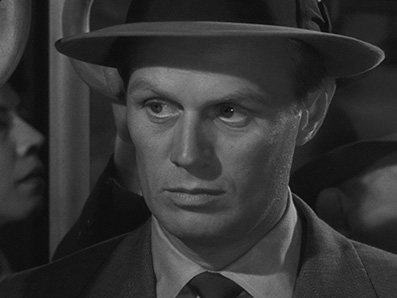
But back in 1950s America, the perceived threat from communism was deemed to be very real, and the hostility between the two continents had by then become known as the Cold War, a period of history when we dodged mutual annihilation by the skin of our teeth and this clash of ideologies fuelled proxy wars all over the globe. Both sides had spies operating on each other's turf, and the fear of national secrets being passed to the enemy helped to fuel public paranoia and make ordinary people nervous and distrustful. Remember good citizens, just because that guy you say hello to as you pass in the morning has a well kept lawn and a winning smile, that doesn't mean that he's not a covert enemy agent.
The 1953 Pickup on South Street was made and set during this period, when simply labelling someone a communist was enough to ensure that the domestic audience would see them as a bad guy and be in no danger of sympathising with them, even if those who opposed them out came across as bullish and self-righteous pigs. Which they don't in this film, by the way. Here Richard Widmark plays Skip McCoy, a professional pickpocket who's not been long out of jail and is just one more felonious act away from a being banged up for longer under a three-strike rule. So he's going straight, right? Well, not exactly. When we first meet him he's riding a subway train, where he quietly lifts a wallet from a handbag belonging to a woman named Candy. Unbeknown to him, the theft is being observed by two men who, although startled by what they are seeing, do nothing to intervene, and at the next station Skip's out of the train before either of the men can grab him. The thing is, the reason they got such a good view of the theft was because they were carefully watching Candy before Skip made his move. Just what, exactly, is going on here?
We soon discover that the men are government agents and that Candy was transporting a filmstrip containing what she believes are business secrets for her ex-boyfriend Joey, unaware that Joey is a communist agent and that the filmstrip actually contains classified government information. Unfortunately for her and the investigating agents, the film was inside the wallet that was lifted by Skip. One of the agents, Zara (Willis Bouchey), enlists the help of a local police captain Dan Tiger (Murvyn Vye), and with the help of professional informer Moe Williams (Thelma Ritter) they soon have their man, but the cheerfully unflustered Skip will admit to nothing. Equally desperate to retrieve the film, Joey convinces the reluctant Candy to track Skip down and bargain with him for it, but neither party has reckoned on Skip's cynical opportunism, and once aware of what he has, he clearly has no intention of handing it over to either side unless the price is right.
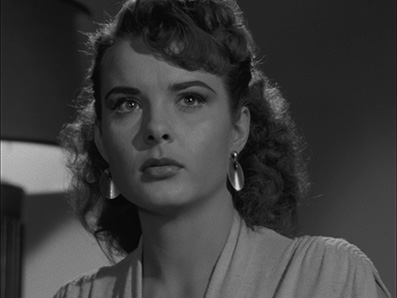
Despite outward appearances, the anti-communism of Pickup on South Street is not the film's mission statement but the setting in which the story unfolds, a fact of 50s American life from which writer and director Sam Fuller was able to spin an utterly enthralling noir thriller populated by those who live on the fringes of American society.* There are no ideological or propagandist lectures here, and the fact that Joey proves to be a ruthless bastard is not specifically tied to his political allegiance. Indeed, there are times when his behaviour plays more like that of a desperate criminal convinced that his own life depends on retrieving the filmstrip. That doesn't stop him from behaving in a cruelly ruthless fashion, which climaxes in a scene that is both heart-rendingly tragic and crucial to the trajectory of film's final act.
Nowhere is the film's game-playing with traditional notions of national pride and allegiance more evident than in the character of Skip McCoy. It's the sort of role Richard Widmark has always excelled at, a sneering, hard-boiled cynic who brushes off threats with an air of amused contempt and who responds to Zara's appeal to his patriotism with a smilingly scornful, "Are you waving the flag at me?" This seems to set Skip up for a predictable character arc, one in which he realises the error of his ways, rediscovers a love for his country and does the right thing. Astonishingly, particularly for an American film of the period, this never happens. That Skip eventually turns against Joey and his comrades is inevitable and narratively necessary if we're to stay in his corner, but he does so for personal reasons and not out of any sense of patriotic duty. Even at the stage when convention and even the film itself would seem to dictate that he will rethink his position, he's still looking for a way to turn the situation to his financial advantage. Then again, look who wrote and directed the film – when Sam Fuller is in charge, all of the usual genre bets are off.
Very smartly scripted and tightly constructed, Pickup on South Street moves at a belt and earns its noir credentials via some dark plot twists, Skip's seemingly boundless self-interest and cynicism, and a level of callous brutality that should keep even the most left-leaning of us from sympathising with the increasingly desperate and unlikeable Joey. But in a sense we should every bit as hostile to Skip, who beneath his cocksure surface is a low-level symbol of amoral capitalism who puts the acquisition of wealth above the perceived good of the society in which he precariously operates, the sort of unprincipled profiteering that has become (or has perhaps always been) the scourge of progressive communities the world over. But as played by Richard Widmark and directed by Fuller, he comes across more as a playful thorn in the establishment's side, an iconoclastic outsider who appears to be having a whale of a time refusing to play by society's rules.
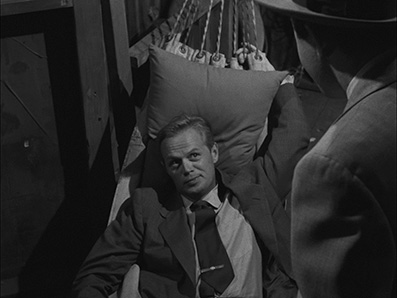
That the role of Skip McCoy fits Richard Widmark like a glove should not be a reason to negatively reflect on his casting here, as it was in some of the contemporary reviews. As I said in the opening line of my review of Fuller's Hell and High Water, no-one could play cynical self-interest quite like Widmark and he clearly relishes the role here – that his above-quoted response to Zara's appeal to his patriotism deserves pride of place in any compilation of favourite lines from Sam Fuller's oeuvre is down in no small part to its delicious delivery. Jean Peters does a sterling job as the put-upon Candy, who is knocked cold by Skip when the two first meet (there's logic rather than bullish male nastiness to this), but later falls for him in a heartbeat and finds herself caught in a largely one-way love affair with a man whose guard is always up and who shows little interest is changing his ways. But almost stealing the film from under Widmark's nose is the wonderful Thelma Ritter as the world-weary and opportunistic Moe, her seemingly encyclopaedic knowledge of the local criminal fraternity enabling her to nail down a list of suspects from Zara's recollection of little more than how Skip held his newspaper, and doing deals with police and Candy like a market trader offloading a batch of stolen goods. It's she that features in the film's most poignant sequence, one that showcases both her talent as a dramatic actress and Fuller's skill at writing and directing gut-punch emotional scenes.
Pickup on South Street was the fourth in a three-year dynamite run of films for Fuller, and in the quality of its execution and its effectiveness as screen entertainment it's right up there with its immediate predecessors The Steel Helmet, Fixed Bayonets! and Park Row as one of his best. His staging of both the drama and action is an object lesson in waste-free, film-crafted storytelling, and is peppered with his trademark use of close-ups and long takes, but this time around he saves his showpiece sequence for the climax, as Skip and Joey slug it out in a subway station in what for my money is one of the most electrifying screen fights in American cinema.
Framed in its original aspect ratio of 1.37:1, this is a solid transfer whose black levels are nonethless just slightly soft, which this may seem a crime for a film noir but it does preserve the detail in darker areas. At its best the contrast range is generous and pleasing, though just occasionally it does feel a little lacking in punch. The detail is generally crisp, with no picture movement in frame and hardly a dust spot to be seen. Facial close-ups and scene-setting wide shots in particular are impressive.
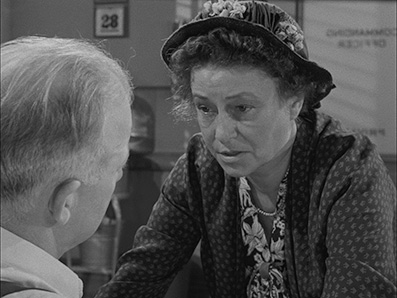
The Linear PCM mono 2.0 track is also in fine shape, the expected range restrictions not as treble-heavy as expected, the dialogue always clear and no background hiss or crackle to contend with.
Optional English subtitles for the deaf and hearing impaired are also included.
Kent Jones (32:13)
Critic, film festival programmer and deputy editor of Film Comment magazine (I have to say it would have been nice if this information had been on the disc for those not steeped in the world of film criticism, though it may well be on the back cover of the release disc) recalls first discovering the cinema of Samuel Fuller and focuses on Pickup on South Street, analysing aspects of the film, including the lead actors and Fuller’s own cinematic technique, and nicely suggesting that Fuller "thinks with the camera." Jones' slow delivery requires a little patience and visually the interview will win no prizes, but there's good stuff here.
François Guérif (23:24)
Framed a little like it was shot with a hidden camera, this interview with French film critic (information also not on the disc) François Guérif stomped headlong through much of what I had written by saying the same things in more detail, but at least I felt I was in good company. Guérif explores Pickup as both a Sam Fuller film and a prime example of American film noir, and discusses the characters, the actors, its social realism and what it says about the poor in America. He also touches on the thorny issue of the changes made to the film in the then more politically left-leaning France, where the dialogue was mis-translated to suggest that Skip inadvertently intercepts details of a drugs shipment. It's all interesting stuff, and at one point Guérif says tellingly of Fuller, "He didn't make film noirs about stereotypes and clichés. In each film there was a social phenomenon that was very realistic and precise."
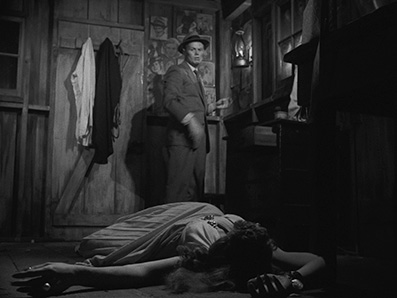
Samuel Fuller (11:42)
Oh joy. A segment from what we can presume is a 1982 French TV piece (it’s framed 4:3, 12 minutes in length and has burned-in French subtitles) has Fuller sat down in front of a Steenbeck looking at the opening sequence of the film and commenting on its dramatic intent and aspects of its production. This includes outlining how the film came about and his original proposal to Daryl Zanuck, which Fuller claims gave the mogul a (metaphorical) hard-on. "I write with the camera," he says at one point. "Once I'm on the set I use the camera as a typewriter." As ever, Fuller is an absolute delight to watch and listen to. I could have done with a couple of hours of this.
Theatrical Trailer (1:47)
A 4:3 framed trailer in less than perfect shape with a somewhat misleading narration. But hell, "No holds barred! No punches pulled!"
Booklet
Heading up the typically fine booklet is an excellent essay on the film by Murielle Joudet (translated from the original French by Craig Keller), and a welcome extract from Fuller's memoir A Third Face: My Tale of Writing, Fighting, and Filmmaking, which is headed with an encouragement for you all to go out and get yourself a copy, a recommendation I heartily endorse. Credits for the film, production stills and the usual notes on viewing are also included.
Another superb work from one of American cinema's most previously undervalued and now treasured mavericks. The slightly soft black levels and intermittent lack of punch to the picture are the only blips on an otherwise solid transfer, and the extras are enjoyable, particularly the brief but splendid Fuller piece. Recommended.
* Credence is leant to this interpretation by the news that FBI director and arch anti-communist J. Edgar Hoover apparently hated the film, and is confirmed by one of the extra features on this disc. Fuller himself also stated in A Third Face: My Tale of Writing, Fighting, and Filmmaking, "I had no intention of making a political statement in Pickup, none whatsoever. My yarn is a noir thriller about marginal people, nothing more, nothing less."
|